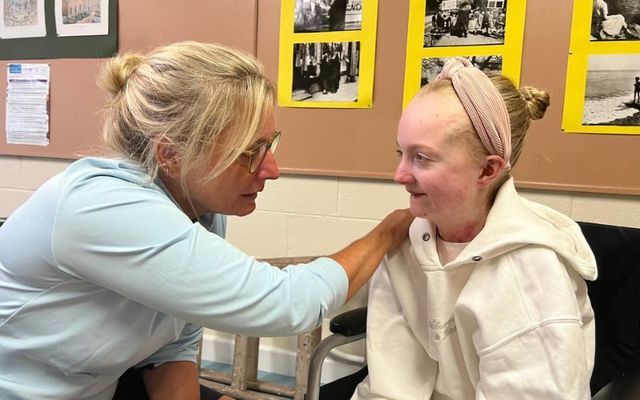The mother of a young woman battling an extremely painful skin condition has hit out at a lack of coordinated support from the Irish State.
Liz Collins detailed a decades-long battle to secure home nursing care for her 20-year-old daughter Claudia, who suffers from the most severe form of epidermolysis bullosa (EB), a rare condition causing fragile, blistering skin.
People with EB are missing the essential proteins that bind the skin’s layers together, so any minor friction, movement, or trauma causes it to break and blister, causing severe pain.
In Claudia's case, skin must be re-bandaged several times a week to prevent blister infection in a painful process taking hours at a time.
Liz described the condition as a "monster," adding that it has shaped her family's life ever since Claudia was born.
"Every chapter of Claudia’s life brings new challenges, dressings have to be done 365 days a year; it’s a horrible place to be, like being stuck in a hole you can’t get out of," Liz said.
Liz was speaking in support of Debra, the national charity that supports families and everyone with the painful genetic condition.
Launching its 2025 pre-Budget submission, Debra claims that the current model of service in Ireland is pushing families to fight unnecessarily for support.
Debra insists that a ringfenced fund of €600,000 for home nursing care would alleviate the burdens for families coping with the lifelong, incurable disease.
Liz said her daughter receives some degree of home nursing care but said the family does not have access to a care coordinator, a central element in joining together different aspects of care.
"Everything is a battle and nothing is straightforward," Liz said.
"Carers often feel like prisoners because the current level of care is fragmented, fragile, and not properly coordinated.
"Many people strongly make their case for support, they might win and get allocated home nursing hours but sometimes there are no nurses to provide these hours, so it’s outsourced."
In addition to calling for a ringfenced fund of €600,000, Debra is also calling on the Government to include an additional €95,000 in the 2025 Health Fund to include €45,000 per annum for a specialist outreach nurse capable of managing complex wounds and infections.
It would also include €30,000 for increased psychological support at St James’s Hospital to safeguard the mental health of EB patients and €20,000 to provide regional points of contact, support and advice for EB patients in Ireland.
"The emotional and physical toll on families is significant, with many carers feeling overwhelmed, isolated and out of their depth," Debra CEO Jimmy Fearon said in a statement.
"We are calling on the Government to prioritise additional acute and regional supports to meet the unique needs of people living with or caring for someone with EB."




Comments